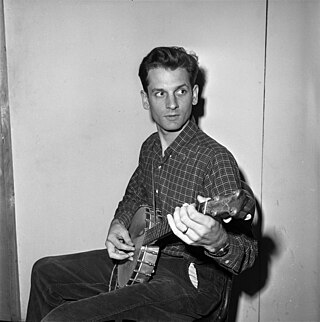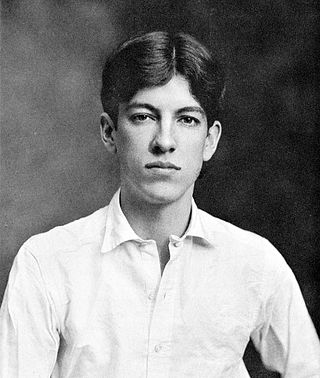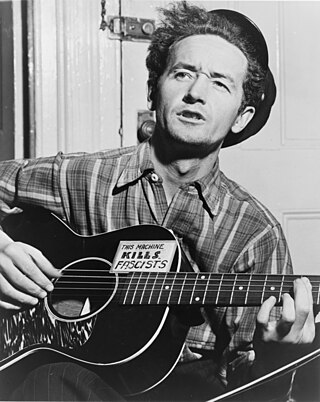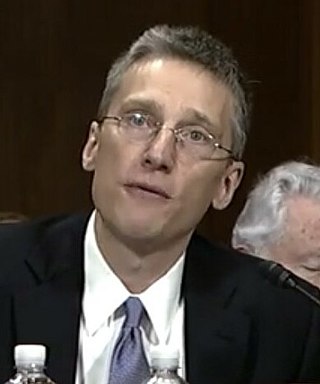
Peter Seeger was an American folk singer and social activist. He was a fixture on nationwide radio in the 1940s, and had a string of hit records during the early 1950s as a member of The Weavers, notably their recording of Lead Belly's "Goodnight, Irene," which topped the charts for 14 weeks in 1950. Members of the Weavers were blacklisted during the McCarthy Era. In the 1960s, Seeger re-emerged on the public scene as a prominent singer of protest music in support of international disarmament, civil rights, counterculture, workers' rights, and environmental causes.

James Henry Miller, better known by his stage name Ewan MacColl, was an English folk singer-songwriter, folk song collector, labour activist and actor. Born in England to Scottish parents, he is known as one of the instigators of the 1960s folk revival as well as for writing such songs as "The First Time Ever I Saw Your Face" and "Dirty Old Town".

"We Shall Overcome" is a gospel song that is associated heavily with the U.S. civil rights movement. The origins of the song are unclear; it was thought to have descended from "I'll Overcome Some Day," a hymn by Charles Albert Tindley, while the modern version of the song was first said to have been sung by tobacco workers led by Lucille Simmons during the 1945–1946 Charleston Cigar Factory strike in Charleston, South Carolina.

Ruth Crawford Seeger was an American composer and musicologist. Her music heralded the emerging modernist aesthetic, and she became a central member of a group of American composers known as the "ultramoderns". She composed primarily during the 1920s and 1930s, turning towards studies on folk music from the late 1930s until her death. Her music influenced later composers including Elliott Carter.
The Weavers were an American folk music quartet based in the Greenwich Village area of New York City originally consisting of Lee Hays, Pete Seeger, Ronnie Gilbert, and Fred Hellerman. Founded in 1948, the group sang traditional folk songs from around the world, as well as blues, gospel music, children's songs, labor songs, and American ballads. The group sold millions of records at the height of their popularity, including the first folk song to reach No. 1 on popular music charts, their recording of Lead Belly's "Goodnight, Irene." Despite their popularity, the Weavers were blacklisted during much of the 1950s.

Charles Louis Seeger Jr. was an American musicologist, composer, teacher, and folklorist. He was the father of the American folk singers Pete Seeger (1919–2014), Peggy Seeger, and Mike Seeger (1933–2009); and brother of the World War I poet Alan Seeger (1888–1916) and children's author and educator Elizabeth Seeger (1889-1973).

Margaret "Peggy" Seeger is an American folk singer and songwriter. She has lived in Britain for more than 60 years and was married to the singer-songwriter Ewan MacColl until his death in 1989.

Mike Seeger was an American folk musician and folklorist. He was a distinctive singer and an accomplished musician who mainly played autoharp, banjo, fiddle, dulcimer, guitar, harmonica, mandolin, dobro, jaw harp, and pan pipes. Seeger, a half-brother of Pete Seeger, produced more than 30 documentary recordings, and performed in more than 40 other recordings. He desired to make known the caretakers of culture that inspired and taught him. He was posthumously inducted into the International Bluegrass Music Hall of Fame in 2018.

Alan Seeger was an American war poet who fought and died in World War I during the Battle of the Somme, serving in the French Foreign Legion. Seeger was the brother of Elizabeth Seeger, a children's author and educator, and Charles Seeger, a noted American pacifist and musicologist; he was also the uncle of folk musicians Pete Seeger, Peggy Seeger, and Mike Seeger. He is lauded for the poem "I Have a Rendezvous with Death", a favorite of President John F. Kennedy. A statue representing him is on the monument in the Place des États-Unis, Paris, honoring those American citizens who volunteered to fight for the Third French Republic while their country was still neutral and lost their lives during the war. Seeger is sometimes called the "American Rupert Brooke".

We Shall Overcome: The Seeger Sessions is the fourteenth studio album by Bruce Springsteen. Released in 2006, it peaked at number three on the Billboard 200 and won the Grammy Award for Best Traditional Folk Album at the 49th Grammy Awards.

"Where Have All the Flowers Gone?" is a folk song written by American singer-songwriter Pete Seeger in 1955. Inspired lyrically by the traditional Cossack folk song "Koloda-Duda", Seeger borrowed an Irish melody for the music, and published the first three verses in Sing Out! magazine. Additional verses were added in May 1960 by Joe Hickerson, who turned it into a circular song. Its rhetorical "where?" and meditation on death place the song in the ubi sunt tradition. In 2010, the New Statesman listed it as one of the "Top 20 Political Songs".

The American folk music revival began during the 1940s and peaked in popularity in the mid-1960s. Its roots went earlier, and performers like Josh White, Burl Ives, Woody Guthrie, Lead Belly, Big Bill Broonzy, Richard Dyer-Bennet, Oscar Brand, Jean Ritchie, John Jacob Niles, Susan Reed, Paul Robeson, Bessie Smith, Ma Rainey and Cisco Houston had enjoyed a limited general popularity in the 1930s and 1940s. The revival brought forward styles of American folk music that had in earlier times contributed to the development of country and western, blues, jazz, and rock and roll music.

WKSP also known as "96.3 Kiss-FM", is an urban adult contemporary radio station in Augusta, Georgia. Licensed by the Federal Communications Commission (FCC) to the nearby community of Aiken, South Carolina, the station broadcasts with an effective radiated power (ERP) of 17.5 kW. Its studios are located at the Augusta Corporate Center near the I-20/I-520 interchange in Augusta, and the transmitter tower is south of Edgefield, South Carolina.
Seeger is the surname of various people.
Rainbow Quest (1965–66) was a U.S. television series devoted to folk music and hosted by Pete Seeger. It was videotaped in black-and-white and featured musicians from traditional American music genres such as traditional folk music, old-time music, bluegrass and blues. The show's title is drawn from the lyrics of the song by Seeger "Oh, Had I A Golden Thread".
Pete Seeger: The Power of Song (2007) is a documentary film about the life and music of the folk singer Pete Seeger. The film, which won an Emmy Award, was executive produced by Seeger's wife, filmmaker Toshi Seeger, when she was 85 years old.
The Sessions Band is an American musical group that has periodically recorded and toured with American rock singer-songwriter Bruce Springsteen in various formations since 1997.

Shangri-La Entertainment LLC was an American film production company established in 2000 by Steve Bing and Adam Rifkin, which was based in Los Angeles, California. It was owned by the Shangri-La Business Group, an organization with interests in property, construction, film, and music.

Ruth Mae Taubert Seeger was an American athlete and coach. She was the first woman to be chosen for the United States track and field team for the 1957 World Games for the Deaf.

Steven Charles Seeger is a United States district judge of the United States District Court for the Northern District of Illinois.















